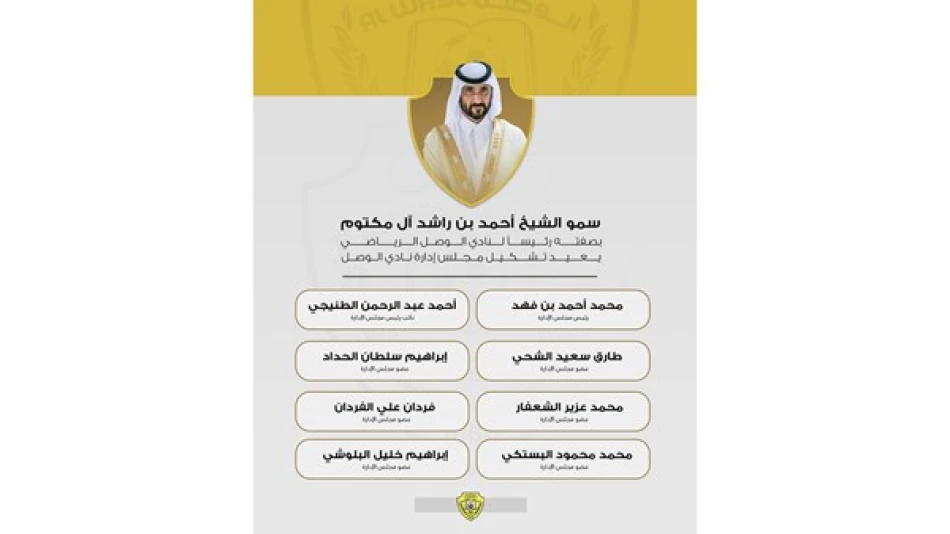
Sheikh Ahmed Bin Rashid Restructures Al Wasl Sports Club's Board of Directors
Al Wasl Sports Club Undergoes Leadership Overhaul as Dubai Seeks Football Renaissance
Sheikh Ahmed bin Rashid Al Maktoum has announced a complete restructuring of Al Wasl Sports Club's board of directors, appointing Mohamed Ahmed bin Fahad as the new chairman in a move that signals ambitious plans for one of Dubai's most storied football institutions. The leadership change comes as UAE clubs face mounting pressure to compete on regional and international stages amid increased investment in Middle Eastern football.
New Leadership Structure Takes Shape
The newly formed board sees Ahmed Abdul Rahman Al Tanaiji appointed as vice-chairman, alongside six board members: Tariq Saeed Al Shehi, Ibrahim Sultan Al Haddad, Mohamed Azir Al Shaafar, Fardan Ali Al Fardan, Mohamed Mahmoud Al Bustaki, and Ibrahim Khalil Al Balushi.
Sheikh Ahmed emphasized the club's prestigious history and the board's responsibility to meet supporters' "limitless ambitions" across all sporting disciplines. The appointment reflects a strategic shift toward professional management structures that have become increasingly common among Gulf football clubs seeking to modernize their operations.
Building on Recent Success
The transition acknowledges the contributions of outgoing chairman Ahmed Mohamed bin Shaafar and his board, who oversaw Al Wasl's return to championship contention in recent seasons. This continuity approach suggests the new leadership will build upon existing foundations rather than implement wholesale changes.
Regional Football Investment Surge
The leadership change occurs against a backdrop of unprecedented investment in Middle Eastern football. Saudi Arabia's Public Investment Fund has transformed the domestic league through high-profile signings, while Qatar continues leveraging its World Cup infrastructure. UAE clubs like Al Wasl must now navigate this competitive landscape while maintaining their traditional supporter base and local identity.
Strategic Implications for UAE Football
Al Wasl's restructuring reflects broader trends in Emirati football governance, where traditional family ownership models are evolving toward more corporate structures. The club's location in Dubai—a global business hub—positions it uniquely to attract international partnerships and sponsorship deals that could fund player acquisitions and infrastructure improvements.
The Path Forward
The new board faces immediate challenges including squad development, facility modernization, and youth academy enhancement. Success will likely be measured not only by domestic trophies but also by performance in regional competitions like the AFC Champions League, where UAE clubs have historically struggled against better-funded rivals from Saudi Arabia and Qatar.
With Dubai's reputation for ambitious projects and rapid transformation, Al Wasl's leadership change may signal the beginning of a more aggressive approach to football investment, potentially reshaping the competitive balance within UAE football and the broader Gulf region.
Most Viewed News

 Layla Al Mansoori
Layla Al Mansoori






